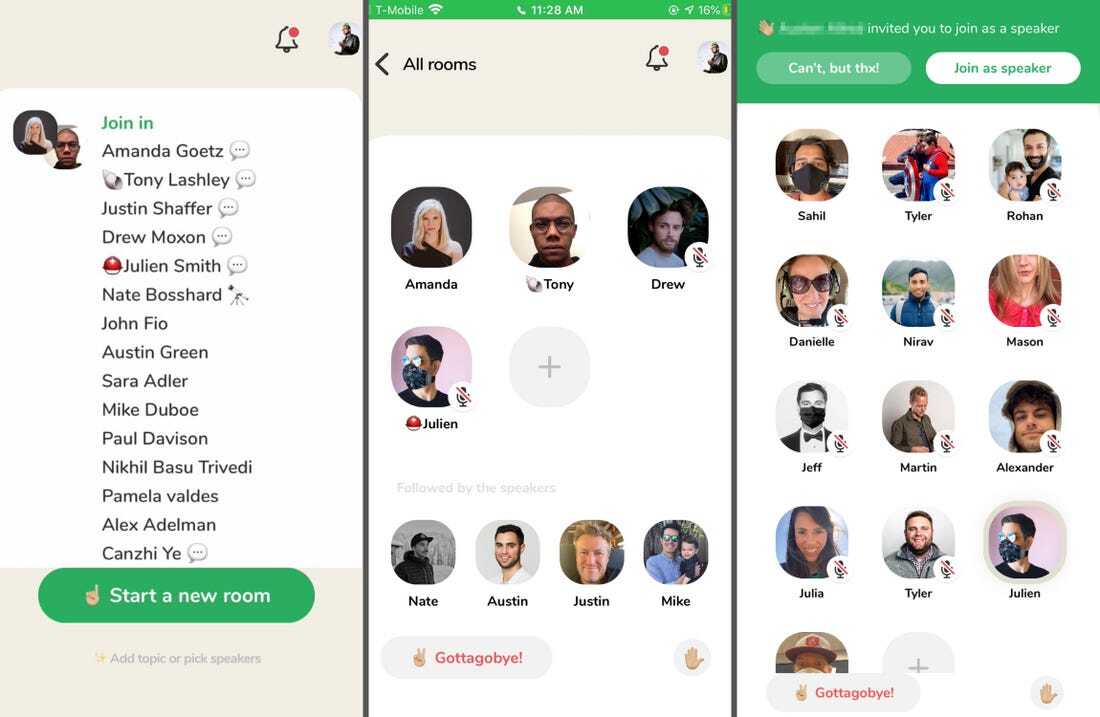In the world of ever-growing social platforms, it’s hard to keep up. One platform among all the emerging “social networks” that you should have on your radar is Clubhouse.
Clubhouse is an invite-only, audio-only social media app that was launched in April of 2020 that allows users to create, host, and join chat rooms for discussions on a variety of topics. Clubhouse was created by Paul Davison and Rohan Seth as they wanted to create a platform that merged the expertise aspects of LinkedIn with the stress-free appeal of podcasts, with the added benefit of audience participation. You can follow your favorite celebrities, tech moguls, businesses, public speakers, and learn about industry news and updates.
Clubhouse isn’t just another mainstream social media platform. You may have noticed how we carefully chose to describe it as an “invite-only” app. To become part of the Clubhouse community, you have to be invited onto the platform — you can’t just “join” like you normally would with any other social media app. This creates an air of exclusivity and mystery around the app, making invites highly coveted, especially in the early days.
Now that the app has grown, it’s easier to get an invite. To get one, you need to reach out to your network on Facebook, LinkedIn, or even Instagram, and let people know you want to be a part of the conversation happening within the app. Once you’re in, you have the chance to be interactive within the community.
Clubhouse’s audio-only format allows users to follow along while on a run or on the drive to work. This screenless element helps overcome the common challenge of screen fatigue that many other visually-oriented social networks struggle with. Aside from sparing your eyes from the extra screen time, the non-video aspect allows for less pressure to feel like you have to “look the part” to gain a following on the platform — you just show up and speak up.
Clubhouse’s Rise to Success
Clubhouse became successful very fast due to the increasing involvement of celebrities on the platform. Recognized personas such as Elon Musk, Mark Zuckerberg, Oprah Winfrey, Mark Cuban, Lindsay Lohan, and Meek Mill, among many others, joined the application, resulting in a diverse range of followers seeking invites on the platform and kicking the platform’s growth into high gear.
Clubhouse’s user growth has been impressive, but its fundraising has proven even more fascinating. Starting with a $100 million valuation in May 2020, Clubhouse rose to $1 billion in January 2021 and now to $4 billion with its latest Series C, announced in early April. With only 9 employees behind the app, Clubhouse is becoming an impressive social media sensation.
The Covid-19 pandemic also fueled the rise of the platform as people sought new ways to stay engaged, learn new things, and get involved in a community. With an unlimited number of topics discussed on the platform, people could listen in on conversations about fashion, technology, sports, business, culture, design, and more. Clubhouse is all about networking and inviting people to participate in free-form unscripted chats — which are great for building brands, both personal and corporate.
How Does It Work?
Clubhouse may seem complicated at first glance, but the apps’ users can be divided into three roles: Speaker, Listener, or Moderator. Users can create their own rooms or “clubs” (recurring rooms) as well as follow other people or clubs. Once you’ve found your people, you’ll have access to an event calendar that lets you know about upcoming events, the keynote speakers, and others who have signed up to join the conversation. If you love being in front of an audience, Clubhouse is made for you. Users can grow their fan base by creating a profile that best represents them, and then use the events and chats to talk about what matters most to them. For companies looking to grow their fan base, solicit feedback on new products, or just want a new way to keep their community updated on new product launches, Clubhouse is the place to be. When you create a new room in the app, you become the moderator, which means you’re responsible for bringing people into the room and allowing them to speak during sessions. Whether you use the app just to listen or you’re an avid public speaker looking to grow your audience, Clubhouse can connect you with others who share an interest in similar topics.
How Can Brands Benefit from Clubhouse?
Clubhouse offers what every advertiser wants: a highly targeted group of influential people in one place. Unfortunately for advertisers, Clubhouse is currently ad-free, which means brands have to get creative in order to reach users. Unlike other social platforms where brands can set up a company profile, Clubhouse is a social network based on individuals only.
What this means in practice is that brands who want to reach a large audience have to partner with influencers on the platform with tons of followers who will be notified when said influencer starts a room.
“With this model, an advertiser can view a particular room as a very dedicated audience ripe for ads and brand activations released to the room’s subject matter, knowing that everyone in the room has a vested interest in the topic and has chosen to participate in the discourse,” says Justin Kline, co-founder of influencer marketing agency Markerly.
In its early days after launching in Silicon Valley in the middle of the pandemic, Clubhouse was an exclusive club for venture capitalists, founders, and well-connected people in technology. The app’s most active users still skew towards entrepreneurs and people interested in business, so it can be a great place to go and jam on new product developments, marketing campaigns, or really even to meet potential new investors or employees.
Clubhouse has about 10 million registered users and about 2 million weekly active users (as of April 2021), which means it can be a great platform to help your business or brand grow. Clubhouse sends a notification to all of your followers when you are on the stage giving a talk, which means you have the chance to attract more eyeballs on your profile, get more followers, and “go viral.” Even after you give your talk, you can then hop into other rooms and deliver value which helps forge new business connections to grow your network. The more people you interact with, the more people will view your profile and invite others to join in.
Small businesses can benefit in a huge way from an app like Clubhouse because it enables anyone to have a conversation with like-minded people. A smaller brand’s voice won’t get muffled or lost in all the noise of every other conversation since people will directly hop into calls to hear you speak about your business. This creates a great atmosphere for brands to put their storytelling voice to the test and create the brand that they want others to see. Even if they can’t set up a company profile and may not initially have the means of partnering with influencers, the CEO of the small business, for example, can set up a profile of their own and market from there.
If you are a small startup looking to expand, the human engagement aspect can be a huge bonus for your business. You are encouraged to seek feedback from others and put your ideas to the test. When you share your successes and failures with others, they may be able to offer some guidance from what they’ve learned along the way and it can help you find the best way to move forward with your business. Through the organic engagement atmosphere of the platform, you can establish a sense of community, project authenticity, establish thought leadership, and connect with investors. If you are a brand that is excited to release news, the platform is a great place for making announcements or sharing company updates that get people excited.
Successful Use Cases
Clubhouse users can find a large following whether they use the app for social connections, business connections, or even as a platform to discuss social or cultural rights.
To mark February Black History Month, Pernod Ricard, the French wine and spirits conglomerate, teamed up with digital media marketing strategist Karen Civil to celebrate the work of Black female entrepreneurs. As part of the campaign which promoted Pernod Ricard’s Martell Cognac brand, Civil hosted weekly conversations with personalities such as beauty mogul Supa Cent, branding expert and founder of Girl CEO Ronne Brown, and fashion designer PreMadonna.
Users like philanthropist Felicia Horowitz, with 3.2 million followers on the app, are among the top followed accounts and use Clubhouse for its social aspect. Felicia is famous for her recurring Saturday night “dinner parties” which regularly feature other celebrity guests and create lots of action in the app. Felicia is not the only one with a loyal following; Ben Horowitz, her partner and founder of the famed Andreessen Horowitz (a16z) venture capital firm, is also a frequent speaker on the platform. The duo holds regular conversations about how to manage and lead organizations — and the “Boss Talk” club now boasts 11.8k followers. Other users, like Elon Musk, don’t use the app regularly, but create a big buzz in the community when they do, as his followers jump at the chance to join in the room.
Cons of Clubhouse: What to Be Mindful Of
Despite all the praise Clubhouse has received in recent months, the app is not without its flaws. For one, once a Clubhouse conversation ends, all chat conversations disappear, making it difficult to stay in touch with others if you couldn’t connect quickly enough during the chat or visit the resources offered. This is great in that it forces you to be “on” the app and interacting from the beginning to the end of the conversation, but sometimes there’s so much going on that you don’t have a chance to sort it all out before the conversation ends.
Even with the exclusivity of being invited into the app, the platform still lacks any form of in-app moderation during sessions, which can, unfortunately, lead to harassment and misinformation during conversations. The app relies heavily on push notifications (which are easy to disable or ignore) and they’ve also been plagued by some privacy issues, according to the New York Times.
Currently, there is no “report” feature on this app, which means that most of this misinformation and harassment goes unreported by users, and as Clubhouse expands, this becomes an issue that needs to be addressed sooner rather than later. The platform itself is constantly releasing updates that empower the community to self-police, and possibly the idea of a badge system for moderators to do so, but no real action has been taken yet. As many users turn to this platform to become vulnerable and speak their truths about their journeys and growth, this is increasingly becoming a disincentive for people to keep up with the app and invite new people – for fear of misconduct.
Conclusion
Clubhouse is a great new social media tool for brands, young or mature, to get involved with. But like with any channel or tool, the most important thing to consider before committing to Clubhouse is how exactly it factors into your business goals and objectives. Whether you’re using the platform to learn how to help your business grow or to participate in threads about your favorite interests, make sure you’re aware of the risks associated with the app. Clubhouse’s ability to generate organic conversations and engagement also opens space for your brand to become vulnerable to certain questions you may not be ready for. After all, the conversations on the platform are extremely open — and by nature, largely fluid and uncensored. No doubt, Clubhouse is a great place to share your story, test your ideas, get advice, make exciting announcements, and start building brand awareness and a loyal following. Just remember to not lose sight of your ultimate business goals and make sure you are using the platform in accordance with your strategy across all other channels and touchpoints.
If you want to incorporate Clubhouse in your marketing strategy and leverage the platform for your brand’s sustainable growth, get in touch!






